|
Swimming & Yoga dominoes coming...eventually.

I made these ages ago and finally got around to posting them! I've always used character dominoes for swimming & climbing, but by making my own we can incorporate some vocabulary.
The nice thing about any domino play is that kids have a motivator to climb towards, and then are encouraged to rest while matching the pieces on the floor. It turns into a focused break between climbs. Atomik has a great selection of kids climbing holds, and I have used Atomik pictures in the hold type dominoes. The free printable PDF's are at the bottom of this page.
0 Comments
More counting songs for: Climbing Classes Counting songs are fabulous because kids can see the end. This helps when they are practicing a skill that they equate to a root canal. I use these ones in toddler & preschool classes with kids in the 1-4 year old range. 5 in the Bed (and the little one said)
More counting songs for: Swimming Classes
I'm avoiding the work that actually needs to be done, so I thought I'd write a post on monkeys instead :). I'm only including one song right now because I just stole the idea, but I'll add more in the future. Swimming songs are coming soon...
5 Little Monkeys (jumping on the bed-not being eaten by alligators)
Tips for Families at the Pool
I've had a lot of parents ask what swimmers should work on over vacation. The most effective "homework" is to play! Just playing freely in the water is a great way to experiment with buoyancy and different body movements. The kids are on vacation too, so don't worry about forcing difficult skills they've been working on in class. Let their instructors be the bad guys while you take on the role of the fun grandparents :). I didn't have any beach pictures of my students, so this one if filled with family vacation pictures from my childhood.
Here are some fun games you can play with school aged kids at the pool:
Here are some of the ways we use Bob in the pool. You can check out the Making Bob post for tips on creating your gobbling monster.
Progress Tracking- Pool
I set aside 5-10 pieces of food in a bowl for Bob. We feed him one piece after each turn (2 if I see a lot of focus and effort in the turn) and then when his bowl is empty it's time for a game.
Fine Motor in the Pool- Youngins
Sometimes Bob is hungry enough to eat a bus. I'll lay out small transportation manipulatives and matchbox cars next to Bob at the edge of the pool. These sink so I don't bother throwing them. 1 swimming turn = feed Bob 1 car. I set out a variety of "picker uppers" so that we can pretend we are cranes lifting the cars or they are covered in radioactive goop and we can't touch them. I happen to have quite a few truck obsessed swimmers right now, but you can use any small objects.
Fine Motor in the Pool- Too Big for Their Britches
For older kids who can easily swim to the bottom we take it up a notch by using tongs or chopsticks. We spread out a bunch of small toys on the bottom of the pool and kids need to dive down and bring them up to Bob without using their fingers. I tried it myself with chopsticks and it's pretty hard! This can be used as a fun reward or to encourage lengthening breath control without bringing attention to it. If some kids know that you want them to stay under for longer they will push their limits and hold their breath for too long. This is why you won't see "underwater contests" in swim lessons anymore. Jump to: Swimming Games, Climbing Games, Yoga & Fitness
All of my toys are named Bob. Mostly because I can never think of creative names. I have mermaids, ducks, cars, and sandwiches all named Bob. My favorite has to be Trash Can Bob. He encourages fine motor skills, keep kids entertained while waiting, and motivates frightened athletes. Bob is pretty awesome. He is velcro intensive, so he can transform from monster to fairy to superhero to mustache man. Let's be honest though- he usually sports his mustache.
Bringing Bob to Life
Trash Cans
The small swing top trash cans work best. 1.5 gallons seems to be a standard size. You can usually find these in Target. Dollar Tree also has a smaller version in several colors right now. I really like this one because it's just the right size and the swinger doesn't fall off as often.
Making Bob
I attach Velcro in several spots for his eyes, arms, horns, wings, mustache, ears, etc. I place soft Velcro on the trashcan itself so that I can use appendages from Build-a-Puppets. I attach the hook Velcro to a variety of googly eyes, animal ears, butterfly wings and mustaches to give the man some personality. The eyes can make the swing lid off balance, so I duct taped a piece of foam to the inside back of the lid. There are also a lot of cute ideas if you search "muncher" + "trash" on pinterest.
Waterproofing Velcro
I have tried all sorts of tactics to make velcro hold up in the pool. The adhesive on standard velcro is a no go. If you allow the proper setting time you can use plumbers pvc glue with standard velcro. I have used Christie's. I've also used industrial strength extreme velcro. It's totally EXTREME brah, and it doesn't have the messy blue goop that you get from the pvc glue. Purple Bob's eyes did fall off after 10 days of pool use with this Velcro... Swimming Games
Progress Tracking- Pool
I set aside 5-10 pieces of food in a bowl for Bob. We feed him one piece after each turn (2 if I see a lot of focus and effort in the turn) and then when his bowl is empty it's time for a game.
Fine Motor in the Pool- Youngins
Sometimes Bob is hungry enough to eat a bus. I'll lay out small transportation manipulatives and matchbox cars next to Bob at the edge of the pool. These sink so I don't bother throwing them. 1 swimming turn = feed Bob 1 car. I set out a variety of "picker uppers" so that we can pretend we are cranes lifting the cars or they are covered in radioactive goop and we can't touch them. I happen to have quite a few truck obsessed swimmers right now, but you can use any small objects.
Fine Motor in the Pool- Too Big for Their Britches
For older kids who can easily swim to the bottom we take it up a notch by using tongs or chopsticks. We spread out a bunch of small toys on the bottom of the pool and kids need to dive down and bring them up to Bob without using their fingers. I tried it myself with chopsticks and it's pretty hard! This can be used as a fun reward or to encourage lengthening breath control without bringing attention to it. If some kids know that you want them to stay under for longer they will push their limits and hold their breath for too long. This is why you won't see "underwater contests" in swim lessons anymore. Climbing Games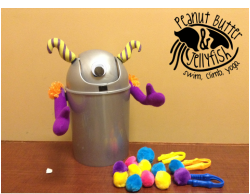
Motivating More Wall Time
Some young climbers need a lot of coaxing to increase time on the wall. I like to turn Bob into a monster and place monster food (pom poms, or whatever you have on hand) in climbing holds at various heights. It helps to have a few "gimmees" that can be grabbed from floor level as well as some higher food that may take a few tries to reach. I place Bob on the gym mat and kids get a small break between climbs as they feed him. To incorporate fine motor or increase rest time you can use tongs or tweezers to feed Bob.
Progress Tracking- Climb You can also use Bob for progress tracking as in swimming above. Lay out 5-10 pieces of food and students must complete a climb or demonstrate a specific skill for each piece. When Bob's bowl is empty they've earned a reward! 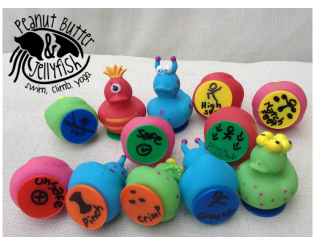
Grab Bag Skills
For older students you can place small foam shapes or plastic discs in holds throughout the gym. I also like to use the rubber duckies from myprevious post for this. Bob loves roast duck. Each token lists a skill or drill that they must complete before feeding it to Bob. Tasks could include things like: 5 burpees, 3 consecutive dynamic moves, traverse using only crimps, climb a V0 with 1 hand, etc. You can also include some goofy skills like: create a victory dance on the finish hold, or name a type of food every time you touch a hold. If I have a class of "new readers" who are just on the cusp of literacy I'll usually go around and read some of the discs as they are collected and act like it's part of the game. It can be embarrassing for a student to ask for help reading his disc. Whenever possible I also draw a picture. Yoga & Fitness Games
Bob Eats His Feelings After discussing different emotions and how to recognize them in ourselves/others it's time to get up and move again. I scatter the emotions all over the room and the class has to hop/skip/jump to grab an emotion and balance it on their head while delivering it to Bob. I've used laminated pictures with different emotions drawn on as well as emotional bean bags. 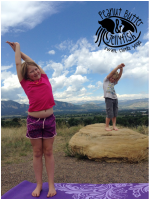 A bunch of bananas A bunch of bananas
Edible Poses
We start with a pop quiz where I hold up an item (play food, dollhouse pieces, small toys) and the kids create a yoga pose to depict the object. Students chose half moon for "banana" and child's pose for "strawberry". We scatter the objects all over the room and students hold each pose for 2 slow breaths before feeding it to Bob. You could also use laminated pictures of the poses you are learning that day.
During ourFrozen Jelly Olaf was definitely my favorite. We played lots of snowman games and threw a million snowballs. Kids really like to chuck things!
This activity didn't go where I had intended but it was really easy to make and the kids loved it! I used 5mm foam sheets because they float a little better and last longer than the thinner foam.
Jump to: Swimming Games, Climbing Games, Yoga & Fitness Swimming Games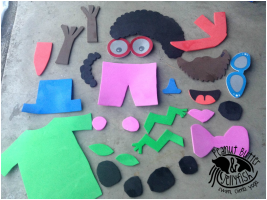
Potato Head Snowmen
This was my original idea and the kids liked it but it wasn't a huge hit. We put all of the foam pieces on a floating mat in the pool and took turns swimming to retrieve the pieces. In addition to the traditional snowman attire I made some clothes and crazy hair/arms so that the kids could create a crazy snowman. 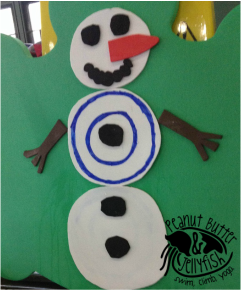
Build-a-Snowman: Earn-a-Reward
To keep students on track, we usually track our progress visually and work towards a reward. "If you work really hard for 5 turns you can choose a game to play". Thanks to Tammy at Swimming with Autism I've been using a peg system. After completing a turn, the swimmer moves a peg from the cup to the peg board. For the winter variation I set aside the traditional snowman pieces and propped a large mat up on the pool deck. After each turn we added a piece to our snowman (2 eyes, 3 buttons counted as one piece each). When he was complete it was time for a game! 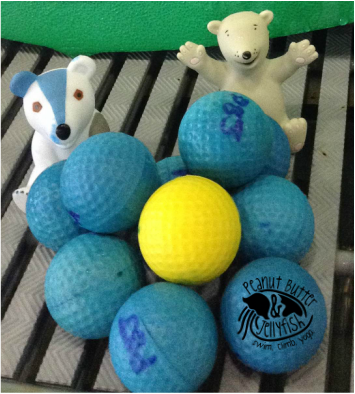 Don't eat the yellow snow! Don't eat the yellow snow!
Snowball Toss
When I was prepping my "Winter Wonderland" toy box I just grabbed all of the white and blue toys that I could find. I threw in some blue foam golf balls without a game in mind, but they turned out to be the crowd favorite. I drew a target on the belly of the snowman and propped him up on the edge of the pool. We threw the golf balls into the pool and after swimming to retrieve a "snowball" we threw it at the snowman. I had the snowman set up right next to the platform to keep the rest of the class occupied while waiting for their turn. Yoga Games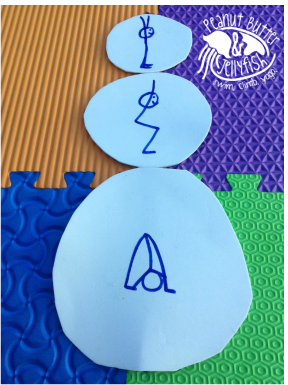
Do You Want to Build a Snowman?
We practiced growing our snowmen by starting off in a small ball and slowly rising into forward fold, halfway lift, chair, and mountain. After we were fully grown we jumped up and tucked back into a ball. The kids thought that the fast tuck was really funny. We listened to the oh so popular song from Frozen and "grew" during every chorus. Snowman Quiz After learning the snowman sequence we had a pop quiz. I drew some very impressive stick figures on white foam circles and placed them face down around the room. The kids had to hop, skip or jump to a piece and copy the pose for 3 breaths. They also tried to balance the piece on their head and carry it slowly across the room, but this had less success :). Climbing Games Bucket on a Belt Bucket on a Belt
Hands Free Stemming
After learning about dihedrals, students climb to find a good spot for hands free stemming. They each carry an arsenal of snowballs in a bucket attached to their waist. Climbers play with effective/energy saving body positions to bombard the snowman (taped to the wall) from their perch. The buckets work well for top rope and auto-belay, but could pose a problem while bouldering. I've been thinking about using wide mouthed chalk bags as a soft & safer alternative.
Scavenger Hunt
A lot of young climbers (2-4 yrs) need some motivation to stay on the wall :). You can hide the snowballs in jug holds throughout the gym and have kids climb to retrieve the balls. After performing a practice fall, they can hop/gallop/skip across the room to throw the snowballs at the snowman
Build a Snowman-Earn a Reward
Similar to the snowman reward system used in swimming. For a group lesson you will need one full snowman per student. After completing a climb, they add one piece to their snowman. When all of the snowmen are built the class gets to play a game. 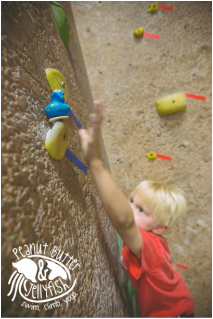
I'm often looking for games that will keep the class occupied while one student is taking an individual turn. These matching games have been working well and are adjustable for many ages/venues. All of the games below use:
You can write directly on the ducks, but since I want to use the same tools for multiple games, I placed a small piece of Velcro on the bottom of each duck and disc using superglue. Oriental Trading has a variety of character ducks, so I have also used this game in specific themes such as Monster Mania, Superhero Day, & Fairy Tale Adventure. I like the Monster & 123 ducks best for everyday use.
Climbing Safety:
We play lots of matching games in the climbing gym by hiding the ducks on climbing holds and placing the laminates on the floor. Kids climb to a duck and bring it down to match it up! Non readers bring the duck to their instructor first for a translation. To reinforce safe climbing rules I use pictures of climbers in different situations. Each duck has a disc saying "safe" or "unsafe". Each child climbs to retrieve a duck and then match it to a corresponding safe or unsafe picture. I have made up flash cards for this game with an easy level (green circles for "safe" and red No Symbols for "unsafe") and a hard level (no hints). You can download my safety matching cards below:
Climbing Terminology:
Using the Monster ducks, I placed the wall angle discs on the ducks and drew stick figure walls on the speech bubbles to show overhang, slab, vertical, arete and dihedral. You can also use photographs to review lots of topics with this game. We have done wall angles, hold types and types of moves (matching, backstep, sidepull) so far.
Swimming Scramble:
You can "waterproof" this game by using the plastic tokens listed above (the wooden discs don't hold up in the pool) and waterproof plumbing glue to hold the velcro. I have made a beginner set and an advanced set that I can switch out as needed. The beginner set lists skills such as "eyes in", "kicks", "swimming arms" by showing a picture of each body part. The advanced set lists strokes and drills such as "butterfly", "3 arm backstroke", and "flip turns". One student swims to retrieve a duck and everyone performs the skill listed. Duck In a Bucket: In the pool it's especially important for waiting children to be engaged. In beginner lessons I scatter the ducks throughout the pool and place the laminates on a floating mat by the platform or on the pool deck within easy reach. I take each child out to swim for a duck and then they can match it up while they wait for their next turn. To maintain engagement I change up the criteria. They can place each duck on a bucket based on color, number (write a number on each laminated bucket), letter, etc. 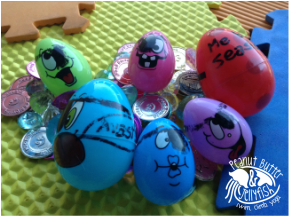
I decided to have a fun pirate week as I said goodbye to my Colorado students before moving to Lake Tahoe. The kids loved all of the pirate games and the egg hunts were a huge hit.
In the spring you can find silly face eggs in any grocery store. I also found them online here. I debated getting solid eggs and gluing an eye patch to each one, but in the end it was cheaper to purchase eggs with faces and piratize them myself with a permanent marker. It has started to rub off but they've held up pretty well. I also wrote pirate phrases on the back of each egg to keep us in the mood. I didn't use "son of a biscuit eater" but I really wish I had! I like to use the same games in multiple venues, so we've played a few variations of this game: 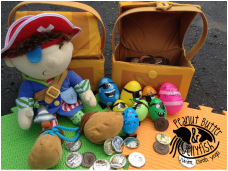
Playground Lunch Hunt:
While the kids were laying on their backs telling each other "cloud stories" I hid their lunches in treasure boxes. I had a series of 8 clues hidden in the eggs that directed them to common playground features. Since we had a 4 yr old and an 8 yr old half of the clues were [cryptic] pictures and half were written so that they had to work as a team. The 8th egg had a picture of a treasure chest and a tree to direct them to their lunch hanging in a tree.
Climbing Communication: We reviewed hold types (terms for different shapes of climbing grips), wall angles and communication by having each child hide a gem, coin, or egg (some holds were too small to fit an egg) in a hold. The hider would give me a description of their hiding place to write down for the finder. For example, the gem might be hidden in "the finishing jug of the blue problem on the yellow overhanging wall". After each climber hid 3 pieces I handed over the clues and they went in search of treasure! For younger climbers, I placed several eggs on the floor at the foot of each wall. When I called out "slab" everyone scrambled to retrieve an egg from the slab wall to find the treasure. 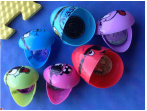
Treasure Guessing:
For a pool game, I placed a small gem or coin in each egg with one egg holding a large gem. We placed all of the eggs on one side of the pool and a treasure chest on the other end. Each child had to swim to the eggs and guess which held the large treasure. 
Several students also started sorting the gems by placing them on top of colored coins.
I used bright pink and robin's egg blue "diamond scatter" from the bridal section of Party City, but I also found assorted colorful diamonds here.
Active Movement:
I filled each egg with a stick figure yoga pose and scattered them in a large circle in a soccer field. I placed a motion card between each egg to get the kids moving. For example, we might "crawl like a snake" to an egg, mimic the pose inside and then "walk like a bear" to the next egg. I sometimes use animal flash cards so that kids can interpret that animals movement themselves. |
AuthorsRebecca & Sarah have been working with children for over a decade. You can find a compilation of ideas for the classroom, home, and athletic fields here. Archives
April 2017
Categories
All
|
||||||||||||
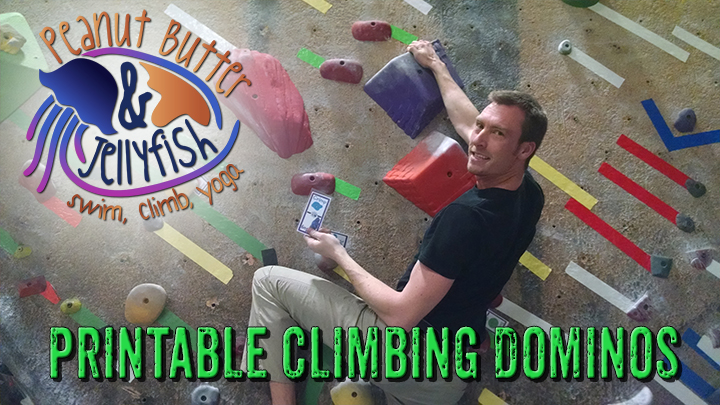
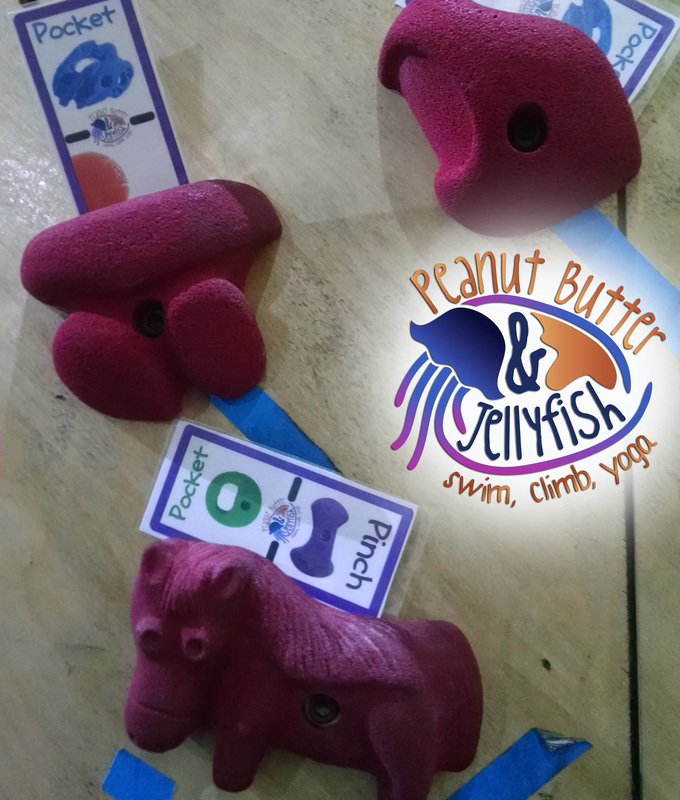


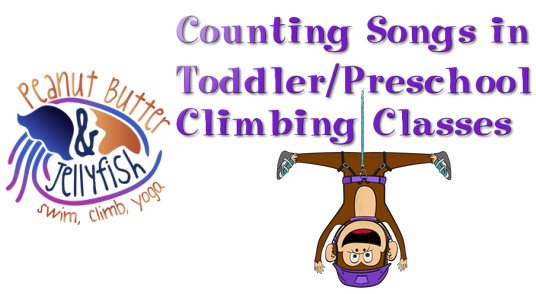
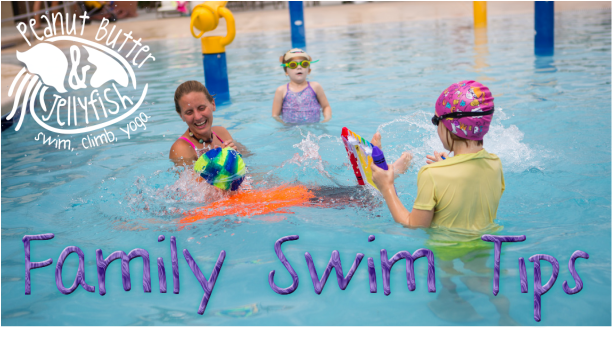
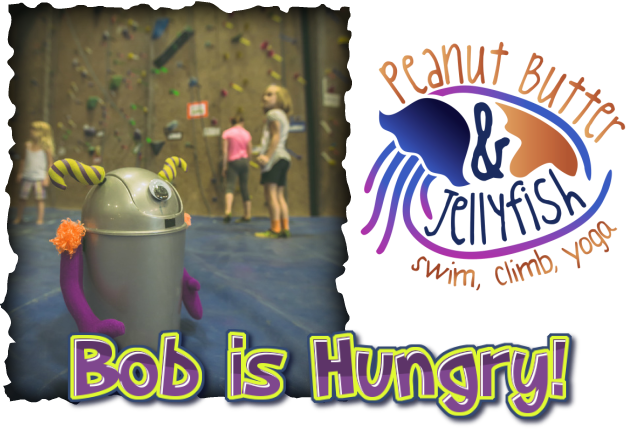
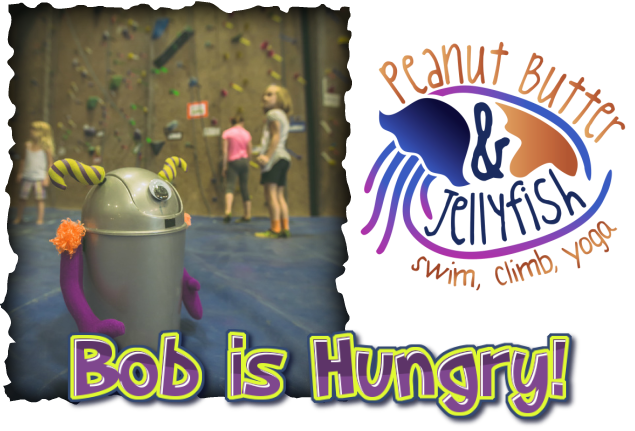
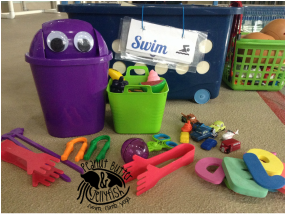
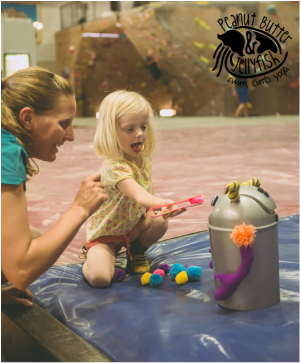
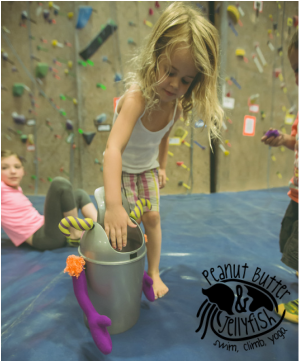
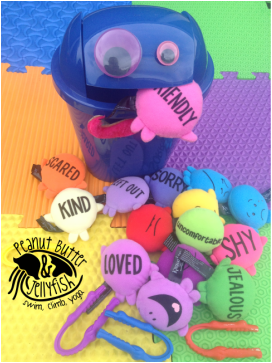
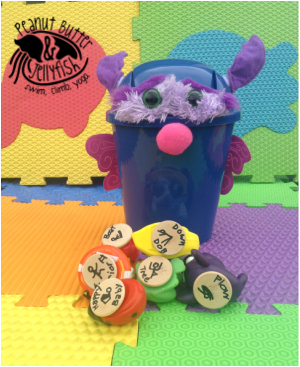
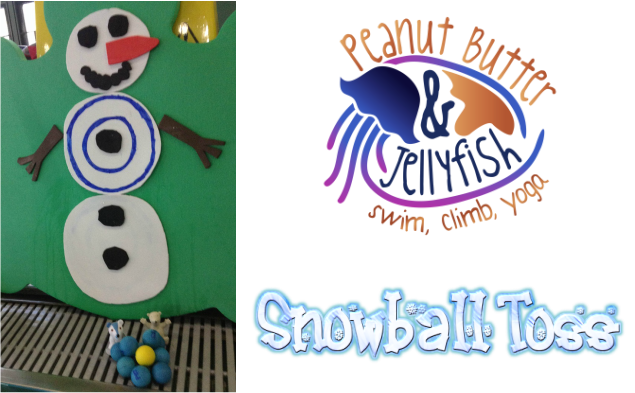
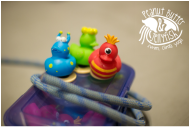
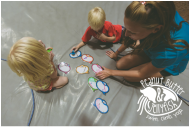
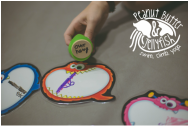
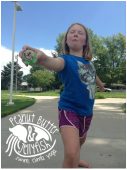
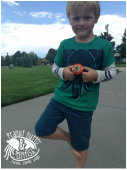
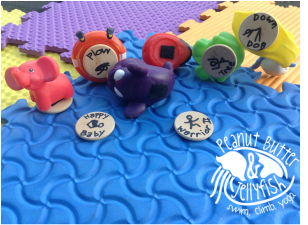
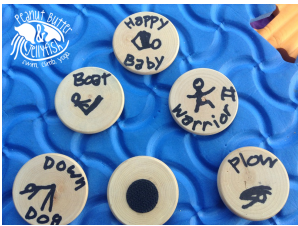
 RSS Feed
RSS Feed